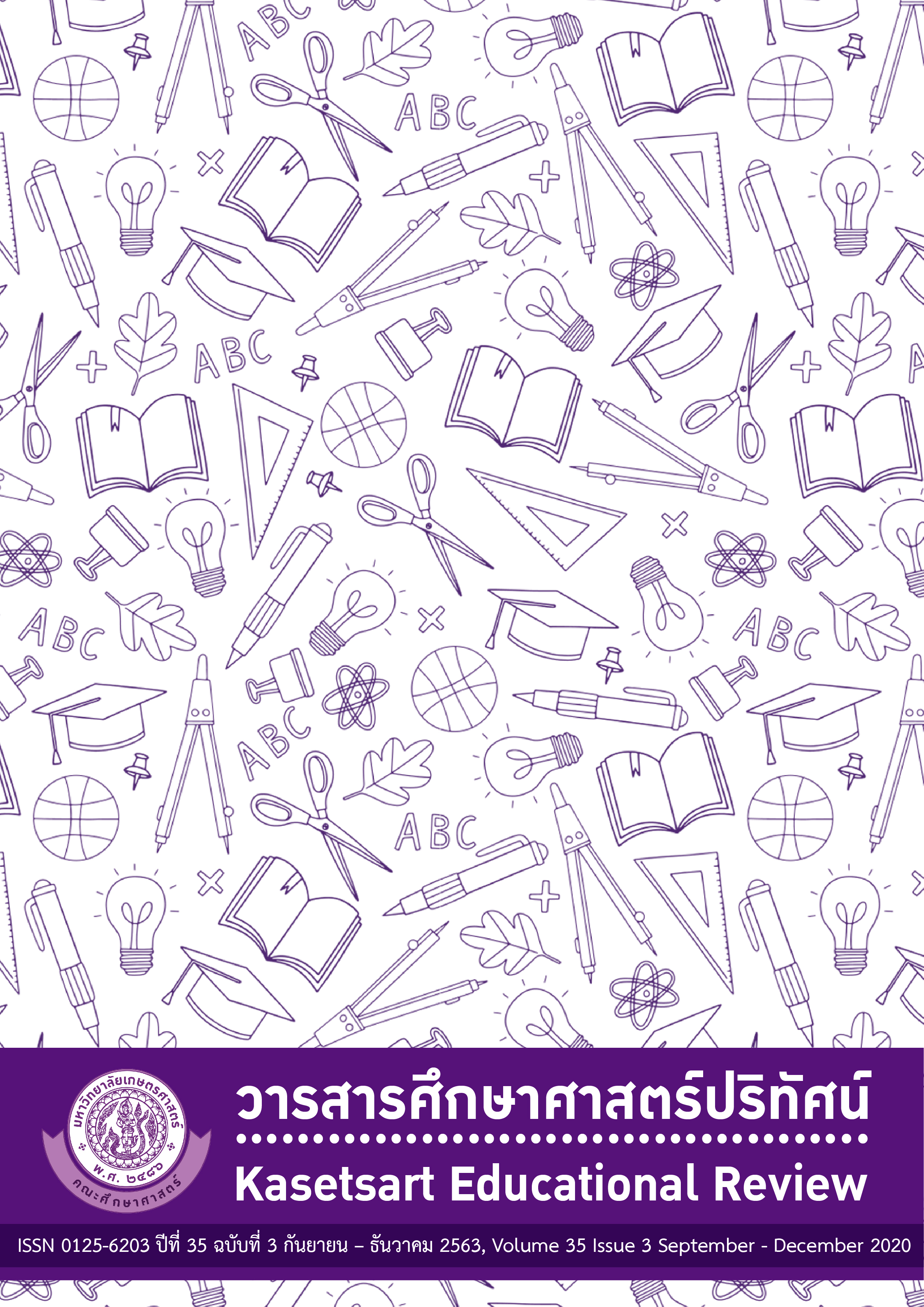กิจกรรมการจัดการเรียนรู้โดยใช้เทคนิคสตอรีไลน์ ตามแนวคิดจิตตปัญญาศึกษา เพื่อเสริมสร้างการรู้เท่าทันดิจิทัล เรื่องการกลั่นแกล้งทางไซเบอร์ ของนักเรียนระดับชั้นมัธยมศึกษาปีที่ 3 โรงเรียนมัธยมประชานิเวศน์ กรุงเทพมหานคร ปีการศึกษา 2562
คำสำคัญ:
เทคนิคสตอรีไลน์, แนวคิดจิตตปัญญาศึกษา, การรู้เท่าทันดิจิทัล, การกลั่นแกล้งทางไซเบอร์บทคัดย่อ
การวิจัยครั้งนี้มีวัตถุประสงค์เพื่อพัฒนากิจกรรมการจัดการเรียนรู้โดยใช้เทคนิคสตอรีไลน์ ตามแนวคิดจิตตปัญญาศึกษา เพื่อเสริมสร้างการรู้เท่าทันสื่อดิจิทัล เรื่องการกลั่นแกล้งทางไซเบอร์ ของนักเรียนระดับชั้นมัธยมศึกษาปีที่ 3 โรงเรียนมัธยมประชานิเวศน์ กรุงเทพมหานคร กลุ่มตัวอย่างในการวิจัย ได้แก่ นักเรียนชั้นมัธยมศึกษาปีที่ 3 ทั้งหมด 1 ห้องเรียน จำนวน 26 คน โดยใช้วิธีการสุ่มแบบกลุ่ม (Cluster Random Sampling) เครื่องมือที่ใช้ในการวิจัย ได้แก่ 1) แผนกิจกรรมการจัดการเรียนรู้ 2) แบบสะท้อนการเรียนรู้ของนักเรียนแบบรายบุคคล 3) แบบสะท้อนการเรียนรู้ของนักเรียนแบบรายกลุ่ม 4) แบบสังเกตพฤติกรรมผู้เรียน และ 5) แบบทดสอบความรู้ ผลวิจัยพบว่า
1) ความรู้ความเข้าใจการรู้เท่าทันดิจิทัล เรื่อง การกลั่นแกล้งทางไซเบอร์ หลังกิจกรรมการจัดการเรียนรู้ มีค่าเฉลี่ยเท่ากับ 16.75 ซึ่งผ่านเกณฑ์สมมติฐานที่กำหนดไว้อย่างมีนัยสำคัญทางสถิติที่ระดับ .05
2) พฤติกรรมการเข้าร่วมกิจกรรม เรื่องการกลั่นแกล้งทางไซเบอร์ของกลุ่ม เมื่อพิสูจน์สมมติฐานการวิจัยที่ตั้งไว้ พบว่า ในทุกกิจกรรมมีคะแนนสูงกว่าเกณฑ์สมมติฐานที่กำหนดไว้อย่างมีนัยสำคัญทางสถิติทางสถิติที่ระดับ .05 ยกเว้นกิจกรรมที่ 2 (เท่าทันความจริง) ที่มีคะแนนต่ำกว่าเกณฑ์สมมติฐานที่กำหนดไว้อย่างมีนัยสำคัญทางสถิติที่ระดับ .05
3) จากการวิเคราะห์แบบสะท้อนการเรียนรู้ พบว่า นักเรียนเข้าใจถึงผลกระทบในการใช้สื่อสังคมออนไลน์ รู้จักตรวจสอบความน่าเชื่อถือ วิเคราะห์และไม่ตัดสินข้อมูลอย่างไม่มีเหตุผล และมีทัศนคติเกี่ยวกับการกลั่นแกล้งทางไซเบอร์ว่าไม่ใช่การกระทำ
ที่ถูกต้อง มองว่าไม่ควรกระทำตนเข้าข่ายลักษณะของการกลั่นแกล้งทางไซเบอร์ ทั้งการระวังการพูด การตัดสินผู้อื่นอย่างเป็นกลางและไม่มีอคติ หรือเพียงความคิดและมุมมองของตนเองเท่านั้น
เอกสารอ้างอิง
Bereau of Academic Affairs and Education Standards Office of the Basic Education Commission, Ministry of Education. (2008). Basic Education Core Curriculum B.E. 2551 (A.D. 2008). Bangkok: Press of The Agricultural Co-operative Federation Of Thailand.,LTD. [In Thai]
Duangjai, W. & Art-in, S. The Development of Learning Activities of Buddhism Subject in Social Study, Religion and Culture Learning Area for Mathayom Suksa II Students By Using A Storyline Method. Journal of Education Khon Kaen University (Graduate Studies Research), 5 (2), 93-99.[In Thai]
Intanont, S. & Sermsinsiri, P. (2018). The Study of How Youth Can Protect Themselves From Cyberbullying. UTCC Academic Day No.2, Bangkok: University of the Thai Chamber of Commerce. [In Thai]
Komcharoen, P. & Polnigongit W. (2018). Children and Digital Literacy. The Journal of Social Communication Innovation, 6 (2), 22-31 [In Thai]
Pansuwan, N. (2012). The effects of learning by Using Role-Playing Computer Games and Storyline Teaching Method of MathayomSuksa 3 Students towards Learning Achievement and Analytical Thinking Ability. Veridian E-Journal, 5 (2), 538-553 [In Thai]
Pinnate, U. (2013). The development of the learning achievement and problem solving ability of buddhist doctrines by storyline method for Mathayomsuksa three student. Veridian
E-Journal, 6 (1), 361-372 [In Thai]
Phoemkhuen, A. (2017). Applying Contemplative Education to Develop Student Quality in Civid Duty Courses at Darapittayakom School, Uttaradit Province. Journal of Education Naresuan University, 19 (4), 265-275. [In Thai]
Rattanarat, N. (2018). Guidelines on protecting victims of Cyberbullying. Local & Global Sustainability: Meeting the Challenges & Sharing the Solutions No. 9, Bangkok: Suan Sunandha Rajabhat University. [In Thai]
Rumpagaporn, M. (2015). Contemplative Education Concept to Practice. Bangkok: Prikwan Graphic.,LTD. [In Thai]
Sahatsapas, T. (2018). Thai children being school bullied as the 2nd of the world. Retrieved from https://news.thaipbs.or.th/content/275069 [In Thai]
Samoh, N. (2014). Youth Perceptions on Cyberbullying. Journal of Behavioral Science for Development, 6 (1), 351-364. [In Thai]
Sintapanont, S. (2011). Teaching methods on Education reform for develop youth’s quality. Bangkok: Technicque Printing. [In Thai]
Sirisomrutai, C. (2017). Perception Attitude and Behavioral Intension. Master of Communication Arts (Strategic Communications). Bangkok: Bangkok University. [In Thai]
Surat, P. (2018). Causes and effects related with Cyberbullying: A case study of Cybervictim Thai Youths. Journal of Suvarnabhumi Institute of Technology (Humanities and Social Sciences), 4 (1), 260-273. [In Thai]
Techataweewan, W. & Prasertsin, U. (2017). Digital Literacy Assessment of the Undergraduate Students of the Universities in Bangkok and Its Vicinity. Journal of Information Science, 34 (4),
1-28
Wongwanich, S. (2017). Classroom Action Research. (19th Edition) Bangkok: Publisher of Chulalongkorn University. [In Thai]
ดาวน์โหลด
เผยแพร่แล้ว
ฉบับ
ประเภทบทความ
สัญญาอนุญาต
บทความทุกบทความเป็นลิขสิทธิ์ของวารสารคณะศึกษาศาสตร์ มหาวิทยาลัยเกษตรศาสตร์ วิทยาเขตบางเขน
วารสารศึกษาศาสตร์ปริทัศน์ (Kasetsart Educational Review)






